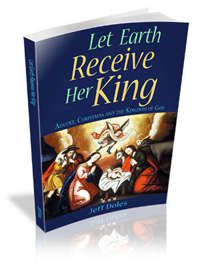Behold, there was a man in Jerusalem whose name was Simeon, and this man was just and devout, waiting for the Consolation of Israel, and the Holy Spirit was upon him. And it had been revealed to him by the Holy Spirit that he would not see death before he had seen the Lord’s Christ. (Luke 2:25-26)
It is as this point in his narrative that Luke introduces us to Simeon, and in a very significant way — with the word Behold. In the Bible, “behold” is a word that focuses our attention and calls us to see something of importance. Others in the temple that day might not have noticed what happened next, but Luke does not want us to miss it.
Simeon was a man of no special prominence in Jerusalem. Neither a priest, nor a politician, nor a religious leader. But he was a man who had received a very special promise from God, revealed to him by the Holy Spirit: Before he died, Simeon would lay his yes on God’s Messiah.
Now, on the very same day that Mary and Joseph brought Jesus into the temple, the Holy Spirit led Simeon in also. “By the Spirit” is how Luke puts it. We do not know exactly how it was, whether it was a conscious revelation or merely a prompting in Simeon’s spirit, to which he had learned to be obedient. However it happened, the Spirit of God got him there at precisely the right place and precisely the right time.
It was a moment of fulfillment, for Simeon, certainly, but more importantly, it was a realization of God’s plan from the beginning. His purpose in Adam, in Abraham, in Jacob, in Moses and the children of Israel, in King David and all the prophets, was now being realized in the presentation of Jesus. Simeon immediately recognized Him for who He was — the Messiah, God’s Anointed. Scooping Him up in his arms, Simeon blessed God:
Lord, now You are letting Your servant depart in peace,Now, coming into the temple at that same moment was a very elderly prophetess named Anna. She had been a widow for about 84 years and had spent her life fasting and praying, night and day, in the temple courts (vv.36-37).Perhaps she had seen Simeon before. Perhaps they had spoken about the promise he had received. Or perhaps it was a life spent in prayer which sharpened her senses so that, when she saw Simeon with Mary and Joseph and Jesus, she immediately understood what was happening. Though Luke does not say, there is no reason to doubt that she, too, was led in by the Spirit. Recognizing the presence of Jesus, Her response was simple, but significant. “She gave thanks to the Lord, and spoke of Him to all those who looked for redemption in Jerusalem” (v. 38).
According to Your word;
For my eyes have seen Your salvation
Which You have prepared before the face of all peoples,
A light to bring revelation to the Gentiles,
And the glory of Your people Israel.”
(Luke 2:29-32)
You see, like Simeon, Anna had an expectation that the Anointed One would soon come and God’s promise would be fulfilled. And they were not the only ones. There were others also who had such an expectation and “looked for redemption in Jerusalem.” Anna sought them out and shared the good news with them.
Of course, Anna and Simeon were old and would not get to see Jesus move through the stages in His life. They would not witness the cross or see His in resurrection. No matter. They had learned to hear the voice of God and to be led by the Spirit. They had learned to live in expectation of the promise of God. They had learned to behold, and to understand what they were seeing. They had seen enough to know that God’s kingdom purpose in Israel would be fulfilled and all the world would be blessed by it. It was now beginning before their eyes.
Two thousand years later, we have still not yet seen the full manifestation God’s kingdom in the world, the will of God being done thoroughly and completely on earth as it is in heaven. But it has begun and is increasing every day. Jesus said, “From the days of John the Baptist until now, the kingdom of heaven has been forcefully advancing and forceful men lay hold of it” (Matthew 11:12 NIV). “The law and the prophets were until John. Since that time the kingdom of God has been preached, and everyone is pressing into it” (Luke 16:16). The apostle John put it like this: “The darkness is passing away, and the true light is already shining” (1 John 2:8).
The infant Messiah, beheld and blessed by Simeon and Anna, grew to manhood and went to the cross for our sake. Forty days after His resurrection, He ascended to His throne at the right hand of the Father. We are now living in the days of King Jesus the Messiah, Lord of heaven and earth. Of Him, the prophet Isaiah said, “Of the increase of His government and peace there will be no end” (Isaiah 9:7).
As you look to a new year, do you hear the promise of God? Do you see the kingdom of God breaking into the world and increasing? Do you behold King Jesus? Do you pray as He taught us, “Kingdom of God, come. Will of God, be done on earth as it is in heaven”? Do you yield yourself to be led by the Spirit of God, that this expectation may come to pass in you?

Let Earth Receive Her King
Advent, Christmas and the Kingdom of God
by Jeff Doles
Preview with Amazon’s “Look Inside.”
Available in paperback and Kindle (Amazon), epub (Google and iTunes) and PDF.





